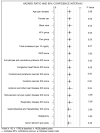Folic acid supplementation and cardiac and stroke mortality among hemodialysis patients
- PMID: 20303789
- PMCID: PMC2892247
- DOI: 10.1053/j.jrn.2010.01.005
Folic acid supplementation and cardiac and stroke mortality among hemodialysis patients
Abstract
Objective: We sought to assess whether the use of folic acid vitamin supplements reduced cardiac and stroke mortality in hemodialysis patients. Further, we examined whether the consumption of folic acid from vitamin supplements >1000 microg compared with the standard 1000 microg, and 1000 microg compared with either a lower dose or no consumption, were associated with reduced cardiac and stroke mortality risk.
Design: We performed a secondary analysis of data from the Hemodialysis Study, a randomized clinical trial examining dialysis treatment regimens over a 3-year follow-up.
Participants: Participants included 1846 hemodialysis patients previously participating in the Hemodialysis Study.
Interventions: There were no interventions.
Main outcome measure: Cardiac and stroke mortality were our main outcome measures.
Results: Based on time-dependent Cox proportional hazard regression models, folic acid consumption from vitamin supplements, above or below the standard 1000-microg dose, was not associated with a decrease or increase in cardiac mortality (P = .53, above vs. standard dose; P = .46, below vs. standard dose). There was also no association between folic acid consumption and mortality from stroke (P = .27, above vs. standard dose; P = .64, below vs. standard dose).
Conclusion: The consumption of higher than the standard 1000-microg prescribed dose of folic acid was not beneficial in reducing cardiac or stroke mortality in hemodialysis patients. Similarly, the consumption of less than the standard dose was not associated with an increase in either cardiac or stroke mortality.
(c) 2010 National Kidney Foundation, Inc. All rights reserved.
Figures




Similar articles
-
Folic acid supplementation and malaria susceptibility and severity among people taking antifolate antimalarial drugs in endemic areas.Cochrane Database Syst Rev. 2022 Feb 1;2(2022):CD014217. doi: 10.1002/14651858.CD014217. Cochrane Database Syst Rev. 2022. PMID: 36321557 Free PMC article.
-
Effect of homocysteine lowering on mortality and vascular disease in advanced chronic kidney disease and end-stage renal disease: a randomized controlled trial.JAMA. 2007 Sep 12;298(10):1163-70. doi: 10.1001/jama.298.10.1163. JAMA. 2007. PMID: 17848650 Clinical Trial.
-
Cancer incidence and mortality after treatment with folic acid and vitamin B12.JAMA. 2009 Nov 18;302(19):2119-26. doi: 10.1001/jama.2009.1622. JAMA. 2009. PMID: 19920236
-
Controlled trials of very high dose folic acid, vitamins B12 and B6, intravenous folinic acid and serine for treatment of hyperhomocysteinemia in ESRD.J Nephrol. 2003 Jul-Aug;16(4):522-34. J Nephrol. 2003. PMID: 14696754 Clinical Trial.
-
Efficacy of folic acid supplementation in stroke prevention: a meta-analysis.Lancet. 2007 Jun 2;369(9576):1876-1882. doi: 10.1016/S0140-6736(07)60854-X. Lancet. 2007. PMID: 17544768 Review.
Cited by
-
Antidepressants for treating depression in adults with end-stage kidney disease treated with dialysis.Cochrane Database Syst Rev. 2016 May 23;2016(5):CD004541. doi: 10.1002/14651858.CD004541.pub3. Cochrane Database Syst Rev. 2016. PMID: 27210414 Free PMC article.
-
Associations of fish oil and vitamin B and E supplementation with cardiovascular outcomes and mortality in people receiving haemodialysis: a review.BMC Nephrol. 2015 Aug 18;16:143. doi: 10.1186/s12882-015-0142-1. BMC Nephrol. 2015. PMID: 26283325 Free PMC article. Review.
-
Associations between homocysteine, vitamin B12, and folate and the risk of all-cause mortality in American adults with stroke.Front Nutr. 2023 Nov 14;10:1279207. doi: 10.3389/fnut.2023.1279207. eCollection 2023. Front Nutr. 2023. PMID: 38035355 Free PMC article.
-
Association between adherence to folic acid supplements and serum folate, and plasma homocysteine among hemodialysis patients.J Ren Nutr. 2011 May;21(3):246-56. doi: 10.1053/j.jrn.2010.04.005. Epub 2010 Jul 21. J Ren Nutr. 2011. PMID: 20650653 Free PMC article.
-
Effects of vitamin E supplementation on renal non-enzymatic antioxidants in young rats submitted to exhaustive exercise stress.BMC Complement Altern Med. 2011 Dec 20;11:133. doi: 10.1186/1472-6882-11-133. BMC Complement Altern Med. 2011. PMID: 22185374 Free PMC article.
References
-
- United States Renal Data System. USRDS 2002 Annual Data Report. Bethesda, MD: US Department of Health and Human Services, Public Health Service, National Institutes of Health; 2002.
-
- Levey AS, Beto JA, Coronado BE, et al. Controlling the Epidemic of Cardiovascular Disease in Chronic Renal Disease: What Do We Know? What Do We Need to Learn? Where do We Go From Here? Am J Kidney Dis. 1998;32:853–906. - PubMed
-
- National Kidney Foundation (NKF) Kidney Disease Outcome Quality Initiative (K/DOQI) Advisory Board K/DOQI clinical practice guidelines for chronic kidney disease: evaluation, classification, and stratification. Kidney Disease Outcome Quality Initiative. Am J Kidney Dis. 2002;39(suppl 2):S1–246. - PubMed
-
- De Vecchi AF, Bamonti-Catena F, Finazzi S, et al. Homocysteine, vitamin B12, and serum and erythrocyte folate in peritoneal dialysis and hemodialysis patients. Perit Dial Int. 2000;20:169–173. - PubMed
-
- Suliman ME, Qureshi AR, Barany P, et al. Hyperhomocysteinemia, nutritional status, and cardiovascular disease in hemodialysis patients. Kidney Int. 2000;57:1727–1735. - PubMed
Publication types
MeSH terms
Substances
Grants and funding
LinkOut - more resources
Full Text Sources
Medical

